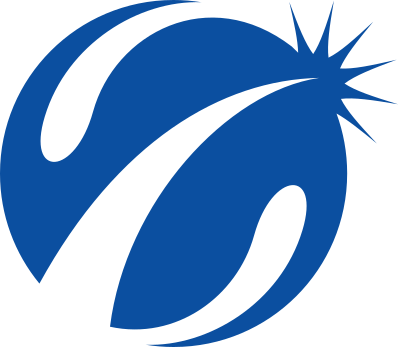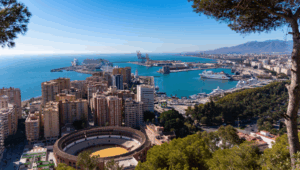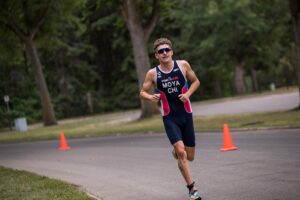Dylan McNeice on his Wanaka win
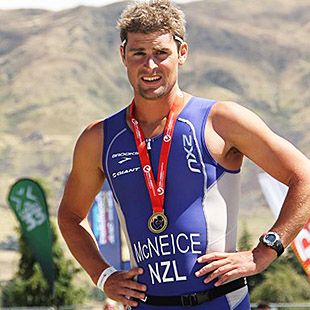
Dylan McNeice, a late bloomer who started triathlon 5 years ago at age 22 and struggled to find a win at the Olympic distance, had his breakthrough win January 19 at Challenge Wanaka in his very first try at the Ironman distance.
McNeice, whose previous best effort at long course was a 3rd place at Singapore 70.3 last year, didn’t cherry pick an easy race to earn his first professional triathlon win. Wanaka is a tough bike and run and one of the men he beat was two-time Ironman World Champion Chris McCormack and the other was fellow New Zealander Jamie Whyte.
McNeice parlayed his background as a national class swimmer and the lessons he learned training with Kiwi triathlon legend Bevan Docherty to what seems like an overnight success – albeit one that took five years.
McNeice answered questions via email from New Zealand.
Slowtwitch: Congratulations on your Challenge Wanaka win in your first Iron-distance race ever. How did you pull this race off against the likes of Chris McCormack, Jamie Whyte, Keegan Williams and Leon Griffin?
Dylan McNeice: I always had the feeling that the longer the race the more it would suit me. I chased the ITU dream for a while and never really focused on what was best for myself, but at the same time coming from that background is an important stepping stone. The last 18 months have been about making that transition to the longer races and the longer training. I know the course and I knew what to expect from the elements. It's safe to say it all just clicked in Wanaka, but I never thought I would come away with the win and I always expected to be caught right up to the finish line!
ST: How thrilled were you when you crossed the line first? How big a surprise was this win?
Dylan: I had been told a few times that throughout the race you go from 'wanting to win' to 'wanting to finish.’ When I crossed the finish line I was more happy to have finished! My body had basically shut down the last couple of kilometers and so it took a while for me to realize what had happened. It was more the way in which I won that surprised me. Like I said earlier, I was almost certain that I'd be caught. But throughout the bike and then the run I kept surprising myself and by the time I got to the finish line I don't think there was any surprise left in me.
ST: What you were thinking when Jamie Whyte surged up to you early on the run? How did you drop him?
Dylan: I lost a bit of time to Jamie and the others in the later stages of the bike when he put a big surge on the others and my back blew out, which meant I could barely ride my aero bars. I went from 7:20 in front at about 130km to 1:30 through transition 2 and I saw Jamie in there. He actually passed me early on in the run as I had to make a toilet stop. Once done there though, I felt great and chased back up to him. I decided that running with him and his experience would be a good option and so did that. I was feeling great, but started getting the news that Macca was running us down pretty quickly at around the 10-12km mark. So I decided then that if I wanted to win, I had to go for it and simply lifted my tempo a bit and slowly pulled away.
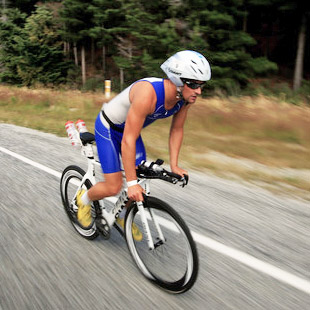
ST: What did Macca say to you afterward? What did Jamie Whyte say to you – and you to him?
Dylan: Macca was awesome. He's always honest and that makes what he says that much more meaningful. He basically just said that this is your distance, stick to it, and you'll have a good future. Jamie said that he was (almost) happy to lose to someone who races out front all day and had nothing but praise for me. I have raced him on and off since I began and watched him win Wanaka in 2011, so it was good coming from him.
ST: Do you have any New Zealand sporting heroes?
Dylan: Bevan Docherty. I admire his work ethic and determination and he's also a legend of a man! He climbed his way up through the ranks and has been at the top for a long time. I admire all of NZ's triathletes. They're all hard working and they're all awesome people. It's a tough game when you live at the end of the earth!
ST: Specifically, what sort of training did you put in to manage the rigors of your first 2.4 mile swim, 112 mile bike and 26.2 mile run?
Dylan: I didn't change too much from my half-distance training. A bit less swimming (15-20km), a bit more riding (550-600km) and a longer long run (100-120km). I really only had a 10-week build-up after returning home from the USA and so didn't want to risk doing any massive weeks. It is the key sessions, long ride, long run, maybe a track set, that count. The most I hit was 35 hours a couple of times and a few more around 32-33. I only train 6 days a week, so it’s hard to do much more. My long ride is Christchurch to Akaroa and return. Seven hours and 190km. The middle section is about 2.45-3 hours of constant climbing and descending. I only did one 3 hour run prior to Wanaka. I realized in the race that it must be almost impossible to train for the 2nd half of the marathon. It is something that you just have to do on the day.
ST: How important was your racing as an Olympic distance competitor for your success at the Ironman distance?
Dylan: It’s good to get the complete picture of the sport and know what each distance requires. For me it was important as it showed me what I shouldn’t be doing both racing and training wise. I find I feel better and respond way more to the longer, slower training and I think it even brings out better short distance form in me.
ST: You’ve done OK for a young competitor — 2nd overall at the 2010 New Zealand Elite Series, 6th at the 2011 New York 5150 race, 6th at Pacific Grove in 2011, 7th at Galveston 5150 in 2011, 3rd at the 2012 Santa Cruz International and 11th at the Dallas Life Time Series Final. Why did you have this breakthrough win at Wanaka against a pretty good field? Does this mean you are better at the long course stuff? Or will this race make you better at Olympic distance?
Dylan: Yeah. OK would be the only way to describe them. Definitely nothing good there. Tommy Zaferes and John Dahlz in Santa Cruz. I am always happier, healthier and in better form at home. I struggle to find the right balance while in Europe or the USA. I had an awesome ˜balanced” build-up and everything just seemed to click. I think that the longer the race the more it suits me. But at the same time, the longer training seems to improve my all round racing ability. I had a local double-sprint in December and for me, I had some good speed considering the Iron-distance training.
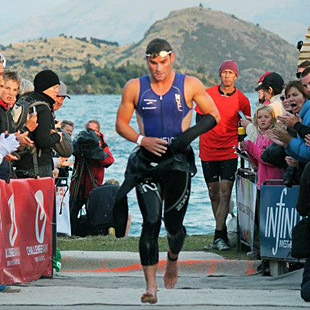
ST: What did your coach Tim Brazier do to get you especially ready for the hard course at Wanaka?
Dylan: We talked a lot about key sessions and the need for everything to come together in the 11th hour. For example I did my only 3-hour run 12 days out. In Iron-distance racing it is one day every 3 or 4 months and everything you do is for that one day. I don’t think you can physically prepare that well for the last one-third of the marathon.
ST: What has your association with Santa Cruz training mates Bevan Docherty, Paul Matthews and Tommy Zaferes done to turn you into a pro?
Dylan: Training with Bevan in 2011 opened my eyes to just how hard some athletes work, but also how we all must find what works for us individually. Paul (Barney) is one of the most underrated athletes around. He is an absolute weapon on the bike, runs way better than people know, and can get himself through a swim in pretty good shape too! Training with Barney was always either a laugh or torture, but again seeing just how strong he was made me realize I had a long way to go. There is one long hill run in particular that I will never forget and they will know which one I am talking about. I thought of that run a lot in the 2nd half of the marathon in Wanaka and it made me remember that I had hurt that much before! Tommy was still breaking through in 2011 so we didn’t do heaps of training with him other than swimming, which is demoralizing. He laps us every 300-400. Both Tommy and I surf so that was key in keeping a bit of balance over the last couple of seasons. All in all I can’t speak highly enough of Bevan and what he’s done for me. But to sum it up my win in Wanaka is built on the foundations of training with him and the others in 2011.
ST: How did you run into these fellows and have them take you on as a squad
mate? Does the fact that Bevan is a Kiwi have any bearing?
Dylan: I asked Bevan in Europe in 2010 if he would like a training partner in 2011 and it started there. I was funded to be there and keep in company while he qualified and trained for London. Paul was in a similar boat and loved it so much now lives there with his fiancé Hillary.
ST: What are your sessions with them like? All business? Some joking?
Dylan: A lot of joking and a lot of business. Never a dull moment with those guys, that’s for sure.
ST: Did it help that Bevan was turning to long course and Paul Matthews has been racing long course for a while? What training have you done with them for long course? Have they offered you valuable advice for racing long?
Dylan:In 2011 Bevan still had the Olympic focus and so I was doing his program. Paul was doing the same program plus extra and seeing that was crucial to my basic understanding of the training required for the longer stuff. Paul gave me some good advice before Miami 70.3 in 2011, my first half, and it definitely helped — especially the pop tarts and chocolate milk for breakfast!
ST: Who were some of the others you trained with who contributed to your development?
Dylan: I have had some awesome training partners here in New Zealand and have had many great opportunities because of them. Laurent Vidal and Andrea Hewitt are two that have helped me heaps over the years with camps and everything in between. Tony Dodds, Tom Davison, Kris Gemmell, Ryan Sissons — basically the entire Triathlon New Zealand crew and their coaches have made for some world class training partners and are some of my best mates because of it.
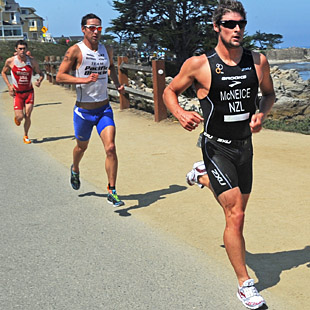
ST: How did your immersion in many sports growing up — surfing, water polo, rugby, soccer and swimming — help prepare you for a professional triathlon career?
Dylan: I think it helped with my overall agility, ability, and training tolerance. Although the more endurance sport I do, the less agility I seem to have left (I no longer jump fences when running), it still helped in developing a semi-decent running technique for example. Ability wise I was always trying to be better at completely different sports and that has helped in developing my bike and run. Tolerance wise I have always done a lot of activity and it has helped me handle the constantly increasing workload and remain injury free (touch wood).
ST: How good a swimmer were you? Best stroke, distance and time?
Dylan: I was a good age-grouper, but with a poor work ethic. It’s OK when you’re younger, but I struggled in my later teens against those doing the work. I was a Flyer at times, but mainly an IMer and Freestyler! Around 16 I was a 54 100fr, 1.57 200fr, 4.05 400fr, 16.20 1500fr, 2.10 200im, 4.35 400im (All long-course-meters).
ST: What were some of your best results in competitive swimming? What level
of competition? What teams were you on?
Dylan: At 16 I won 5 golds and a silver at New Zealand age group champs and won at least one title through all my years at the competition from 13-18. I was 2nd at New Zealand Open nationals in the 200im at 18. I was in a few New Zealand teams under Commonwealth Games level. My most memorable win was at the Trans-Tasman (Australia and NZ) Tri Series — 3 competitions over 5 days against the six best 16 and under swimmers from AUS and NZ. I wasn’t a sprinter, but managed to win the 100fr in the Canberra leg of the competition.
ST: When you quit swimming where did you turn?
Dylan: To be honest I strongly disliked swimming for quite some time. I went to university and started a drinking career!
ST: Who and what led you to triathlon?
Dylan: A swimming/triathlon coach, Roly Crichton, who was based at the now demolished QEII stadium in Christchurch, rang me up one day and told me to come to a training camp in late 2004. I went and have never looked back. Roly has been a massive part of my triathlon career and many other careers as well. If you’ve been to Christchurch for triathlon you will know Roly!
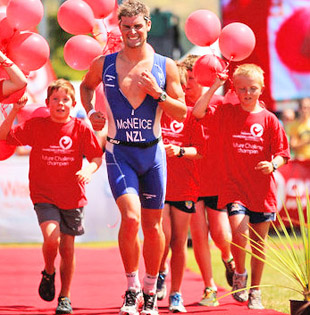
ST: Tell us about your family. What are the sporting history and talents of your parents and siblings?
Dylan: Mum did a bit of ballet, but was sporty at heart I think. Dad played the odd sport, but has surfed for as long as he has walked. Older sister Jo is more of an artist and a good one, too. Older brother Brennon is the golfer, but was talented at anything he tried.
Younger brother Marsh is a very good surfer and has been in the odd magazine here in NZ, but he also played water polo for New Zealand growing up. Younger sister Isla was in to swimming, netball and rowing, but wasn’t as keen on the competitive side of it all.
ST: What was it like growing up in Christchurch?
Dylan: I have always loved Christchurch, but never truly appreciated it until I started triathlon and got out and explored the hills, the flats and everything in between. As a triathlon destination it is second to none for me and many others and I would say it is still holding on to that even after the earthquakes. In terms of growing up you have the beaches and the surf in the summer and the mountains and the snow in the winter. The city is big enough to have everything you need and want, without having the mess of some other major cities around the world. Most importantly though I have my family and friends there and I guess that makes the difference for all of us.
ST: How has your parents’ home in Christchurch been affected by the big earthquakes? Do you still have a home there?
Dylan: My dad built our family home 25 years ago (Google it: 18 Mermaid Place, Southshore, Christchurch, NZ) in a location that is irreplaceable. Our home is still there and easily livable, but it is located in a Red Zone, meaning that the land is deemed un-economical to repair and we have until May to get out of the house. After that, ours and hundreds of others along the estuary front, will be demolished and replaced with parkland. It will be a sad day to see it go. There are between 5,000-10,000 homes in Christchurch that are Red-Zoned.
ST: How have you done racing for your German First Division team?
Dylan: Like my other results I did OK. Ironically I had my best results in the super short and fast races. I seem to struggle over the 10km run distance as it requires real sustained speed, rather than power (super sprints) or strength (long stuff). I’m a bit heavy for a 10km sprint, which is what those guys seem to do. I wouldn’t give up my time in the German League, like I said earlier you need that varied background to get you through.
ST: What are your strengths and weaknesses in the swim, bike, run? How have you attacked your weak spots?
Dylan: Swim: I hate hot water in wetsuits. I think cutoff temperatures for wetsuits are too high. I really struggle both physically and mentally when it’s warm water and still wetsuit legal,
Bike: I lack a bit of sustained speed that you need for say a 40km non-drafting race. I find I ride fairly similar over all distances and could possibly have ridden around 5 minutes quicker in Wanaka, as I was feeling strong, but my back blew out. So that’s a weakness in itself.
Run: Similar to bike. I don’t run too much quicker over the different distances, but find that 4 minutes per kilometer pace reasonably comfortable.
My strength in general is my ability to handle some good workloads without getting injured.
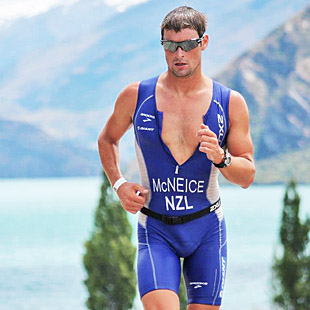
ST: What is it like being based in Santa Cruz? What do you do for fun outside of training your brains out?
Dylan: I was only fully based there in 2011, but spent a bit of time there last year for study purposes. I really enjoy Santa Cruz. It is probably the best training environment I have been to in the USA and it has great surf to boot, which for me is rather crucial. I hate being land-locked.
ST: What were some of your obstacles you have overcome to get to this breakthrough?
Dylan: I guess the biggest obstacles I overcame were consistently average results, but always having faith that the longer stuff would suit me and persevering with the work that was required. It can be a real mental battle to keep pushing through. But I can now say it was worth it. I had decided that Wanaka would be my last big race and had told my friends and family that I would only re-consider if I won.
ST: How might this win affect your sponsorship situation?
Dylan: It might, and I hope, allow me to gain a few sponsors and put a financial base beneath me, rather than living race to race. This way your focus becomes that of performing, rather than the necessity to make some money at the next event and then the next.
ST: How did you celebrate your win?
Dylan: I had a quiet dinner with my family and some friends who were out there all day supporting me and then went down to the finish line party that Challenge is famous for to bring home the last few athletes. We had a few Champagnes to celebrate. Challenge also threw a big after party, which was combined with Bryan Rhodes’ 40th celebration. It may have been one of the biggest (for a small town anyway!).
ST: What’s next for you this season?
Dylan: I am going to race two of our remaining national series events to keep things moving and will decide on the big races within the next couple of weeks. I really enjoyed the Challenge atmosphere and I would love to stick to their events. Which ones will have to be decided, but they will include two, maybe three more Iron-distance events this year.
ST: How good can you be at this sport?
Dylan: Ha ha. Tough one. Can you ask me in 5-10 years? I think I have shown my potential at this distance. But potential is one thing, actually doing it consistently is another.
I am excited though, because I now have a good understanding of what works for me and I am confident I can deliver on that a few times a year over the Iron-distance.

